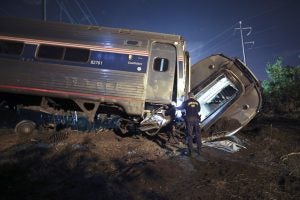Amtrak 188 derailment isn’t Philadelphia’s first passenger train disaster
As investigators try to make sense of the Amtrak 188 derailment, longtime residents may be reminded of a passenger railroad accident that took place a mere mile away in 1943.
Listen 1:17
This Sept. 7, 1943, photo shows the wrecked cars of the Pennsylvania Railroad's Congressional Limited train, in Philadelphia. The Labor Day train jammed with 541 passengers derailed, killing 79 passengers and injuring 117 others. (AP)
As investigators try to make sense of the Amtrak 188 derailment, longtime Philadelphia residents may be reminded of a passenger railroad accident that took place a mere mile away in 1943.
Scott Knowles, associate professor of history at Drexel University, joined NewsWorks Tonight host Dave Heller to discuss what has come to be known as the Frankford Junction train wreck.
The incident occurred over Labor Day weekend in 1943, with train operators accommodating a large number of passengers, including enlisted men and women on leave, by attaching 16 cars to Pennsylvania’s Congressional Limited service.
The train was travelling at a high rate of speed as it left Philadelphia. By the time it passed through Frankford, it had caught fire, causing an axle to break. “One of the train cars was projected into the air, completely vertical, and seven other cars derailed,” Knowles said.
Seventy-nine people were killed in that crash, and more than 100 passengers sustained injuries.
While train derailments have occasionally occurred in the area, Knowles stressed that it is uncommon, especially in recent years.
Passenger deaths due to derailment in the Northeast Corridor have been low, almost to a vanishing point since the year 2000, Knowles said. And while these fatal accidents should not be taken lightly, “it would be inappropriate to take from this and extrapolate that travel by rail is a dangerous thing to do,” Knowles said.
WHYY is your source for fact-based, in-depth journalism and information. As a nonprofit organization, we rely on financial support from readers like you. Please give today.


